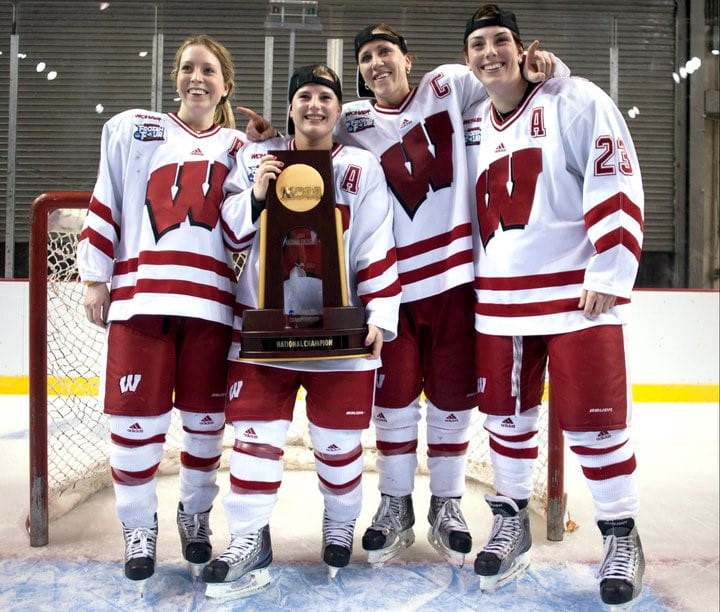
By Geena Fennell
For the Love of Hockey
I was fortunate enough to grow up playing hockey, a sport that I love. I loved it so much that I went on to play in college, where I won a NCAA National Championship in 2011. I was also fortunate enough to play with USA Hockey; I was in their active player pool after college and participated in various camps over my playing career. Because of my love for the sport, I decided I wanted to examine the business side of hockey – from both the players’ and administrations’ perspectives – when I came to the Kellstadt Graduate School of Business to pursue my MBA.
Women’s USA Hockey: Then and Now
The women’s USA hockey team took home the gold medal in 2018, the first team to do so since the inaugural Olympics for women’s hockey in 1998. Yet, this win received limited exposure in the media, a fact that unfortunately aligns with the way the team is treated in the sports field as a whole.
The USA Women’s hockey team is not given the same rights as their male counterparts, like financial support during the season and health care benefits to name a few, and a push for progress wasn’t made until a group of players partnered with Ballard Spahr Law Firm in 2015.
I played with the 2018 Captain of USA Hockey, Meghan Duggan, as well as Illinois native and two-time Olympian Kendall Coyne-Schofield. They are not only ambassadors for the game, but are advocates for equal rights for players in USA Hockey. Prior to the partnership with Ballard Spahr Law Firm, Duggan says, “Us as players were never able to stand together as a united front, so it is difficult to make change when not everyone is on the same page.”
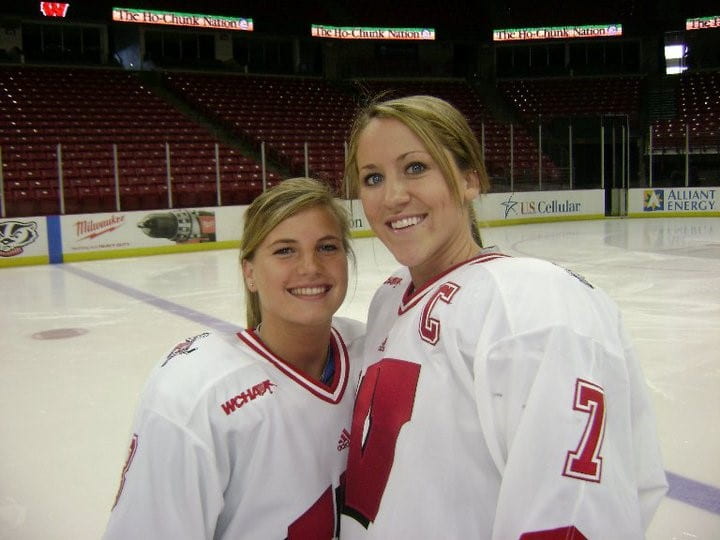
Geena Fennell (L) with Meghan Duggan during the 2010-2011 University of Wisconsin Hockey Season.
But when negotiations to advance women players’ rights began with USA Hockey, they didn’t make any progress. So when the 2017 World Championships were being planned in Plymouth, Michigan, the team used the opportunity to ensure their demands were met by announcing a boycott. They missed the entire pre-camp until their needs were met by USA Hockey.
The move worked. Finally, the two parties negotiated a four-year contract, which included full funding during Olympic and non-Olympic years.
Before the contract, all active players for the national team were being paid the same amount with a monthly stipend in order to train and prepare in between Olympic Games. The contract ensured this included benefits through the US Olympic Committee, better injury and maternity coverage through USA Hockey, and the creation of a women’s advisory committee that meets monthly to discuss improvements consisting of players, representatives from the NHL and USA Hockey. What an accomplishment!
The Professional Women’s Hockey Players Association
Another major change in women’s hockey came in 2019 when the USA hockey players, along with a legal team from Ballard Spahr, and various advisors, created the Professional Women’s Hockey Players Association.
Historically, between Olympic years, national team players participated in the Canadian Women’s Hockey League without compensation. However, in 2015, the formation of the National Women’s Hockey League ensured the athletes were paid to play for the first time.
The league’s long-term structure, however, was not sustainable enough with sponsors or support from the NHL, so the Professional Women’s Hockey Players Association formed with their own board, advisor team and support from big names in women’s sports, such as Billie Jean King.
The best players always compete in different tournaments throughout Canada and the US. The goals of the association are to not only grow the game, but to have a professional league ultimately backed by the NHL. As Kendall Coyne Schofield stated during our conversation, “The infrastructure of a successful league has been in place by the NHL for 100 years, they just need to make room for women to be a part of that, and we can’t do it without the league and player’s support.”
Women in Hockey: Behind the Scenes
Women are playing a major role on the administrative side of hockey, too, and some of that is happening right in our backyard within the Chicago Blackhawks organization. Meghan Hunter is one woman making a difference by running senior vice president/general manager’s Stan Bowman’s schedule, and handling so much behind the scenes to make day-to-day operations run smoothly. Her colleague Annie Camins, meanwhile, has put in 11 years building the BlackHawks Fan Development program to grow the game in our community. You may not recognize these names, but these women are growing the game in Illinois.
Both Hunter and Camins believe that now, more than ever, is a great time for women in sports. Hunter explains: “There has been a push in our organization as well as the NHL to expand upon diversity and inclusion, and women are starting to take on more roles than ever before.”
After speaking to these amazing women, I learned how change is happening for women athletes in the fight for equal rights. More women are taking on administrative roles and opening doors for other women to enter. However, there is still a lot of work to be done. The more we can support our fellow women in hockey—by following the team on social media, going to their tournaments and events and getting young girls and women involved in the sport to grow the game—the more we can continue to build on their foundation and improve the opportunities for women hockey players and professionals in the future.
Geena Fennell graduated from the University of Wisconsin-Madison with a bachelor’s degree in history. She works full-time as an account manager for a large staffing and recruiting company and is completing her MBA at the Kellstadt Graduate School of Business, with concentrations in leadership and change management, as well as sports management.
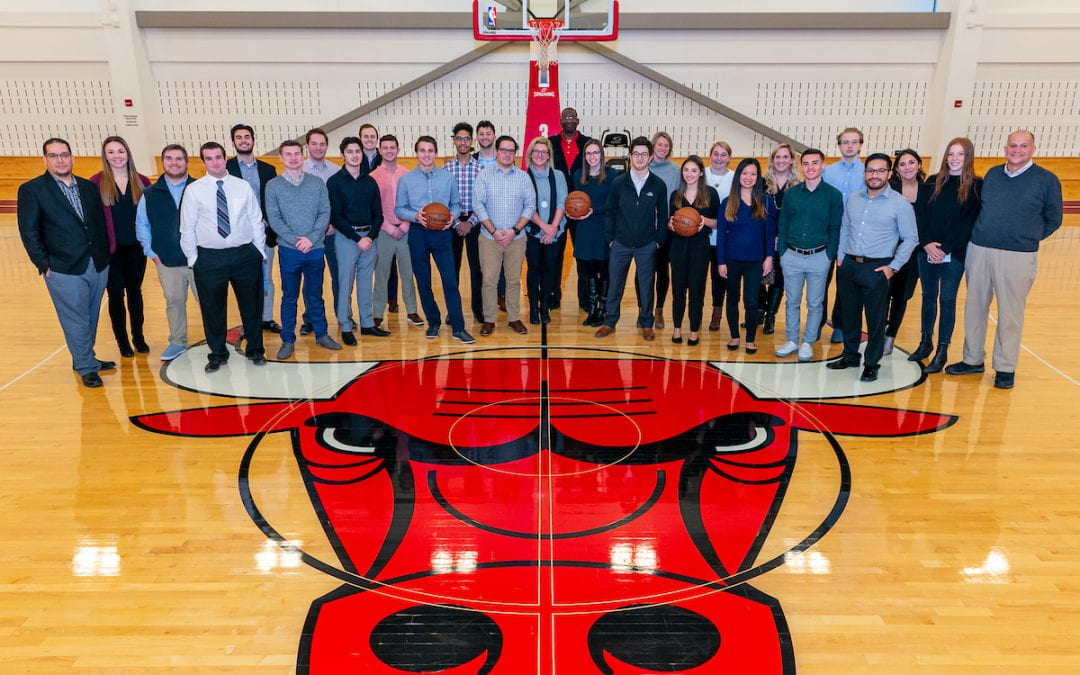
By Larissa Gojdycz | Photos by Kathy Hillegonds and Randall Spriggs
When I first read about the “Behind the Scenes with Chicago Sports Organizations” course, the only thing I could think of was sign me up. Then I realized that the class was one week long, Monday through Friday, so would require me to take time off from work.

The class attends a Blackhawks game at the United Center. (Photo by Randall Spriggs)
Being employed full-time while attending the MBA program at the Kellstadt Graduate School of Business is not uncommon for many students. Balancing work with graduate school is not easy. But after thinking it over, and realizing I could complete an otherwise 10-week course in a one-week time frame, I knew it would be worth it.
The week-long course ended up offering so much more than what I had expected. It was jam-packed with events ranging from speaking to a panel of DePaul alumni who work in sports to watching the Blue Demons men’s basketball team beat Texas Tech in overtime. When coworkers questioned why I took time off from work to go to class, I questioned why they wouldn’t take the time for a class like this.
Here are some highlights from the week:
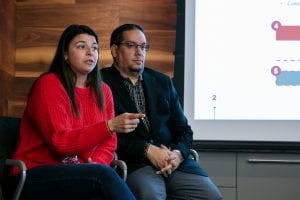
Jacqui Lorio, director of Guest Services for the Chicago Bulls, speaks to the students. (Photo by Randall Spriggs)
Meeting Chicago Sports Teams
Our class met and visited five major Chicago sports teams. That’s right, we went to the Bears, Blackhawks, Bulls, Cubs and White Sox offices and stadiums, where we met with the employees of each team and received tours of the facilities. One of my favorite tours was of the American Airlines 1914 Club at Wrigley Field, led by Cubs Senior Vice President of Sales & Marketing Colin Faulkner. A few years ago when the Cubs wanted to increase revenue without being able to add seats, they dug out the dirt from under the seats in the stadium and created three premier clubs. The 1914 Club was a sight to see. The Cubs designed the room to replicate the era of the 1910/1920s, with gold and sleek accents. The Chicago Cubs offers the 1914 Club to ticket holders in the section behind home plate, where they can access drinks and food and buy exclusive Cubs gear only available to that suite. It was amazing to see how a company was able to think out of the box to increase revenue without adding seats to a stadium.
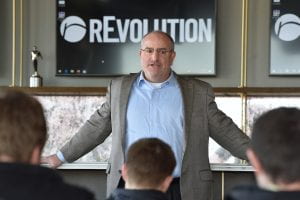
Students visit the Chicago headquarters of rEvolution, a sports marketing and media agency. (Photo by Kathy Hillegonds)
Visiting Sports Agencies and Companies
Another component of the sports industry we learned about was sports agencies and companies. Our class visited three agencies that deal directly with sports teams or companies that have sports sponsorships and/or relationships, like Gatorade, which was one of the companies we visited. We got to see the behind-the-scenes of how these agencies execute marketing campaigns for brands that want a sports integration or experience. Our class ended the week with a brainstorming session with the agency 4FRONT, which gave us some hands-on experience with the work they do and some interesting insights on how they do it.
Networking
Whether it was with the sports teams, agencies, brands or even fellow students in the class, meeting and networking with people was a definite highlight of this course. Over the week we met with more than 70 professionals in the sports space and were able to talk one-on-one with whomever we wanted to. It was invaluable being able to connect and chat with everyone. At the end of the week we had a round-table discussion panel with DePaul alumni who currently work in sports: Kacie Dohrmann of Northwestern Athletics; Mike Gordon of Learfield/Northwestern Sports Properties; Nick Bennett of the Blackhawks and Tim Weaver of the Wolves. We also met with three Kellstadt Graduate School of Business alumni, who were once students in this course: Max McNutt of Marketing Werks, Roger Uy of DePaul Athletics, and Graeme Jones of 4Front.

The class visits the White Sox at Guaranteed Rate Field. (Photo by Kathy Hillegonds)
On top of making connections with people during the site visits, I made many connections with students in the class. Many of us were in the same boat with our careers, so we were all very excited to be exposed to the number of people we got to meet as well as make connections among ourselves.
These highlights are just a small peek into the amazing and productive week I had with the “Behind the Scenes with Chicago Sports Organizations” course with Andy Clark, director of the sports management program at the Driehaus College of Business. The days were filled to the brim and we were always on the go, but the experience is something that will stick with me for the rest of my MBA journey, as well as career.
Larissa Gojdycz graduated from Marist College in New York with a bachelor’s degree in advertising. She works full-time as a media manager for a large retail company and is pursuing her MBA, with a focus on entrepreneurship, at the Kellstadt Graduate School of Business. Originally from northern New Jersey, she is still adjusting to Chicago winters, even though she’s lived in Chicago for five years.
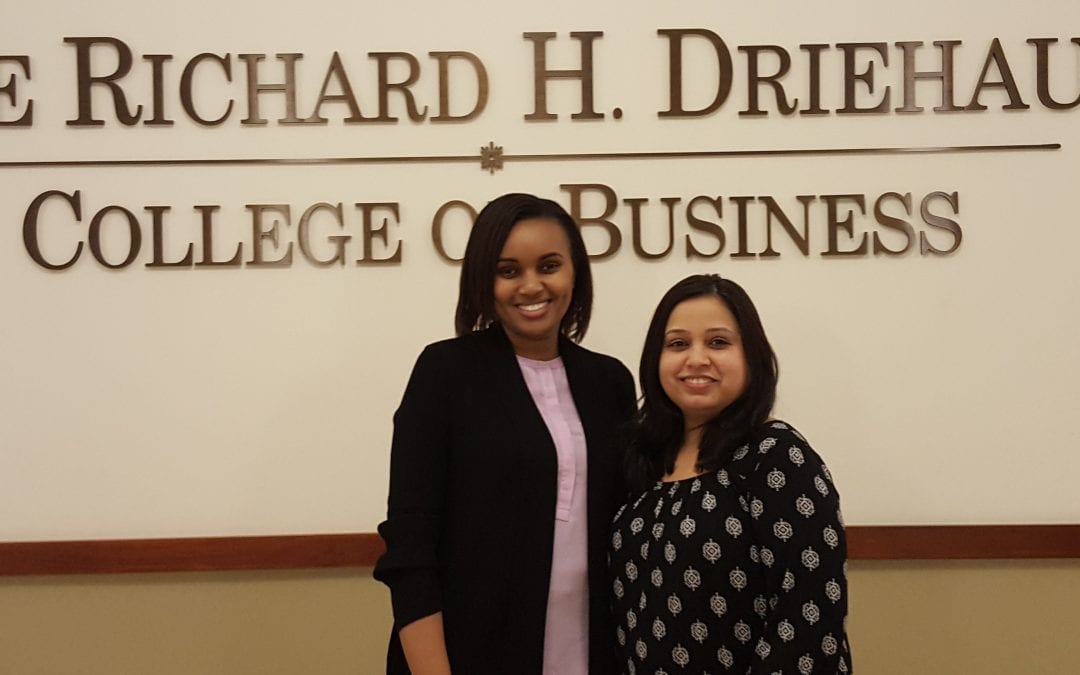
Making the decision to return to school can often be a difficult one, and even more so when a student chooses to attend an academic institution abroad. Three Kellstadt MBA students came together to reflect on their academic year as international students and the connections they formed with their classmates and faculty. Priscilla Mwaura, Shweta Gujrathi and Jing Liu selected DePaul University based on its strong academic reputation, but these students gained more than just an education–they discovered a community.
Mwaura chose to relocate from her home country of Kenya in part due to Chicago’s diverse economy and reputation as a top financial city. Kellstadt offered not only AACSB accredited classes, but also a faculty made up of industry experts and entrepreneurs well connected in the Chicago business community. Both were vital to Mwaura, who wanted to ensure that the MBA program she selected was reputable if she were to leave Kenya.
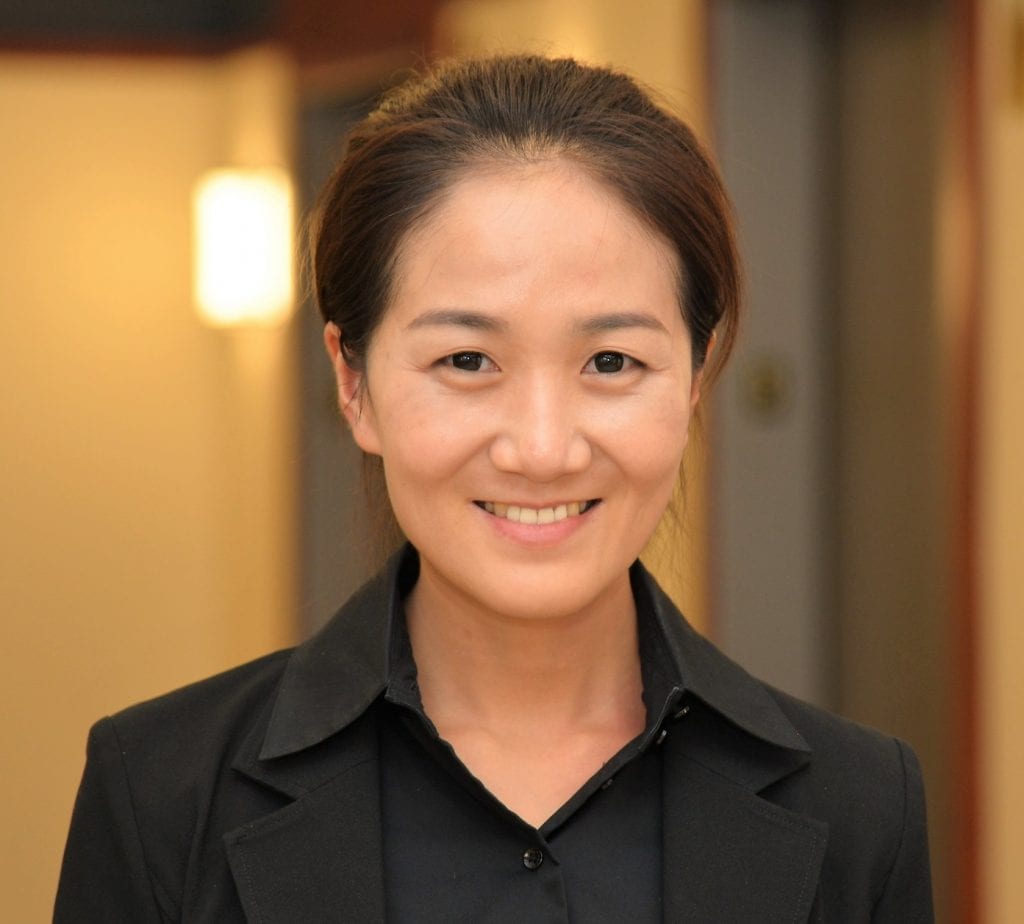
Jing Liu
Kellstadt’s financial reputation also attracted Liu. “Kellstadt has provided an international perspective,” Liu says. “Not only have I learned about the American economy, but also the economies of Northern Ireland and the United Kingdom through a study abroad trip.” For Liu, this professional knowledge has been invaluable. Liu continues, “I’ve been able to gain experience in some of the top financial industries and network with DePaul’s vast alumni network, helping to position me closer to achieving my career goals.”
Mwaura agrees that her first year at Kellstadt has broadened her outlook on global business, sometimes in surprising ways.“Some classes, such as MGT 584: Consulting Skills, developed my skill set in areas I knew little about before,” Mwaura says. “The learning environment at DePaul fosters teamwork and networking. Forming and sustaining these skills and relationships will directly impact the direction my career takes.”
Gujrathi found value not only in the academic resources, but also in the relationships she formed within the Kellstadt community. “The admissions team became my partners in the process even before I enrolled at DePaul, and I continue to receive the same support from the faculty and staff,” Gujrathi says. “Having someone to stand by you is particularly important for international students as they face various challenges in a new country.”
It has been a year full of education and networking for the three, and they look forward to finishing their degrees in 2019. With the support of the Kellstadt community they are positioned for success, whether in Chicago, or abroad.
Learn more about:
Contributors:
- Shweta Gujrathi is pursuing her MBA in Marketing full-time at Kellstadt Graduate School of Business
- Priscillia Mwaura is pursuing her MBA in Finance full-time at Kellstadt Graduate School of Business.
- Jing Liu is pursuing her MBA in Finance full-time at Kellstadt Graduste School of Business
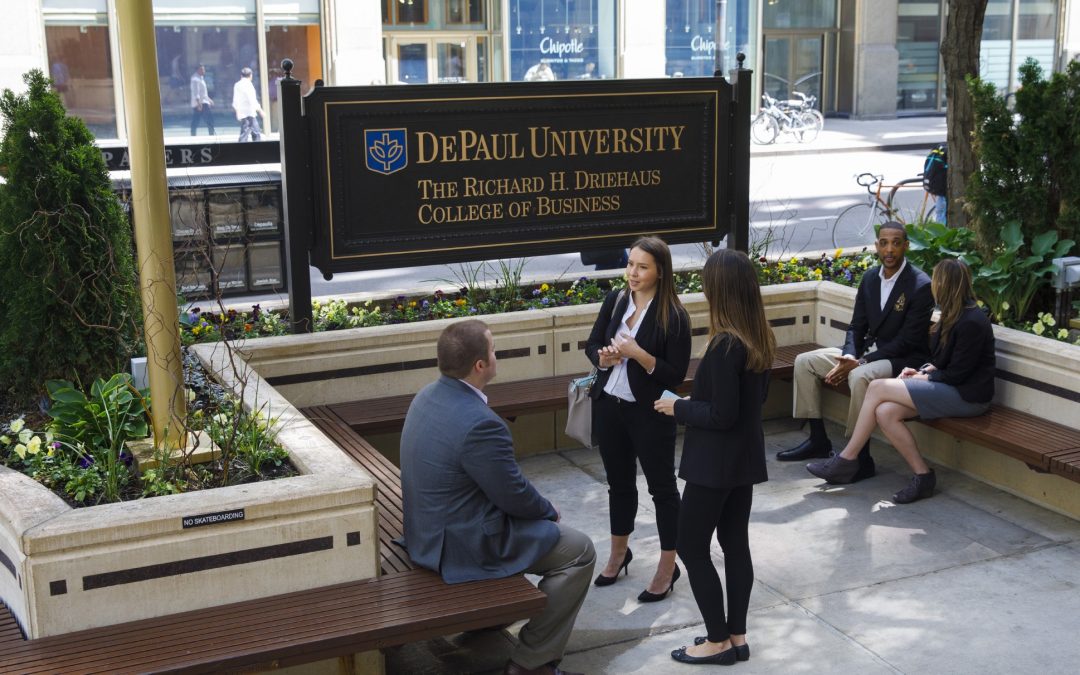
Kellstadt students begin their MBA/MS journey for a variety of reasons; they may want to continue their studies right after a bachelor’s degree, advance in their careers or transition into a new career. Often, life as a graduate student means that there are work, family and community commitments. While it could be possible to earn an MBA or MS degree interacting with professors and fellow students only in course lectures, students can translate education to experience by getting involved. To enhance your MBA and MS experience at DePaul, Kellstadt provides numerous opportunities to get involved, such as career-building resources, graduate student organizations and community service.
Career Building Resources
The Kellstadt Career Management Center (CMC) provides networking and career counseling that can be developed in parallel to the academics of your degree. Also, the CMC offers a variety of workshops, as well as résumé review and mock interview opportunities.
Student Organizations
There are many Kellstadt graduate student organizations related to each graduate focus of study that you can join. Joining a student organization is a great way to meet fellow students, professors and alumni. Kellstadt’s student organizations allow you to put theory into action while networking with professors and alumni who are experts in their fields. From Kellstadt Marketing Group’s Case Competition to the DePaul Society for Human Resource Management’s “Innovation in HR” panel discussion there are countless opportunities to get involved.
Volunteerism
One of the biggest advantages of DePaul is that it is located in Chicago, providing many opportunities to become involved in community service. I’ve had the opportunity to work with two accounting- and finance-related local organizations: Ladder Up, which provides tax preparation assistance, and Operation HOPE, a nonprofit that brings financial literacy to younger generations. There are also several community organizations such as the Greater Chicago Food Depository and Care for Real, as well as other local shelters and religious organizations. DePaul also hosts Vincentian Service Day, an annual tradition that brings together students, staff, faculty and alumni to participate in a day of service with more than 50 community partners in the Chicagoland area and cities around the world.
Becoming involved will help tie in your academic experience to your original goals and make it more meaningful. It may even confirm your decision to pursue a particular concentration of study.
Learn more about:
Author: Sabrina Wing is pursuing her MBA part-time at the Kellstadt Graduate School of Business.
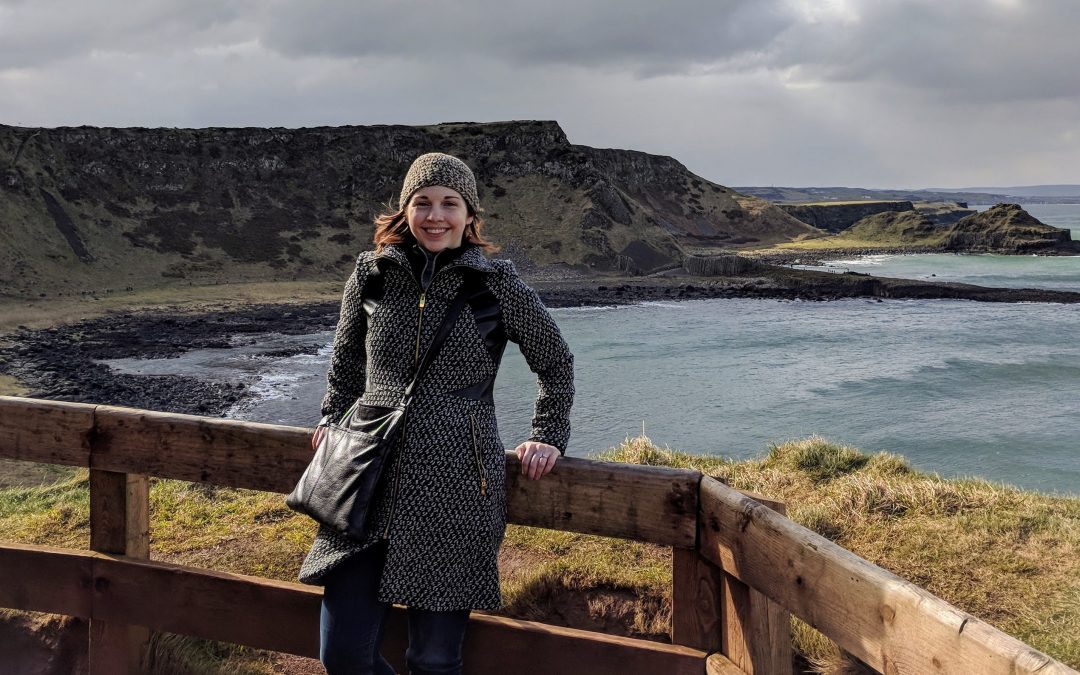
A group of 19 DePaul students traveled to the Republic of Ireland and Northern Ireland/UK over Spring Break to better understand Brexit (the departure of the United Kingdom from the European Union). Led by Economics Professor Tom Mondschean and Christa Hinton, assistant dean and director of the Kellstadt Graduate School of Business, the experience offered students the opportunity to learn about Brexit from two perspectives: Ireland and the United Kingdom. The trip also offered students the opportunity to visit cultural venues to learn about Irish history, the troubles in Northern Ireland, the role the Titanic played in Belfast industry and the business history of Guinness and Irish whiskey distilleries.

Students had the opportunity to experience local culture, such as Dublin’s famous Temple Bar.
“This trip was a fantastic way for students to comfortably experience two countries and cultures in one week and learn about a topic that will directly affect businesses and individuals,” said Mondschean. “By meeting with business and government officials from both countries, students were able to begin to understand the complexities of Brexit and how people continue to grapple with the uncertainty.”
Hilary Perschke, a Kellstadt part-time MBA student, said, “The opportunity to study abroad in Ireland has given me a perspective that is invaluable to my career growth and a chance to differentiate myself in a competitive market. I have gained knowledge from both a business and cultural standpoint that has set me apart from my peers in my field. The connections I have made helped me expand my network to view business dynamics from an international lens.”
Part-time MBA student Jory Nelaimischkies also described the benefits of the experience. “I knew I wanted to take advantage of a Study Abroad program while at DePaul, and as a working student I was incredibly excited by the idea of a ‘Spring Break’ trip,” said Nelaimischkies.
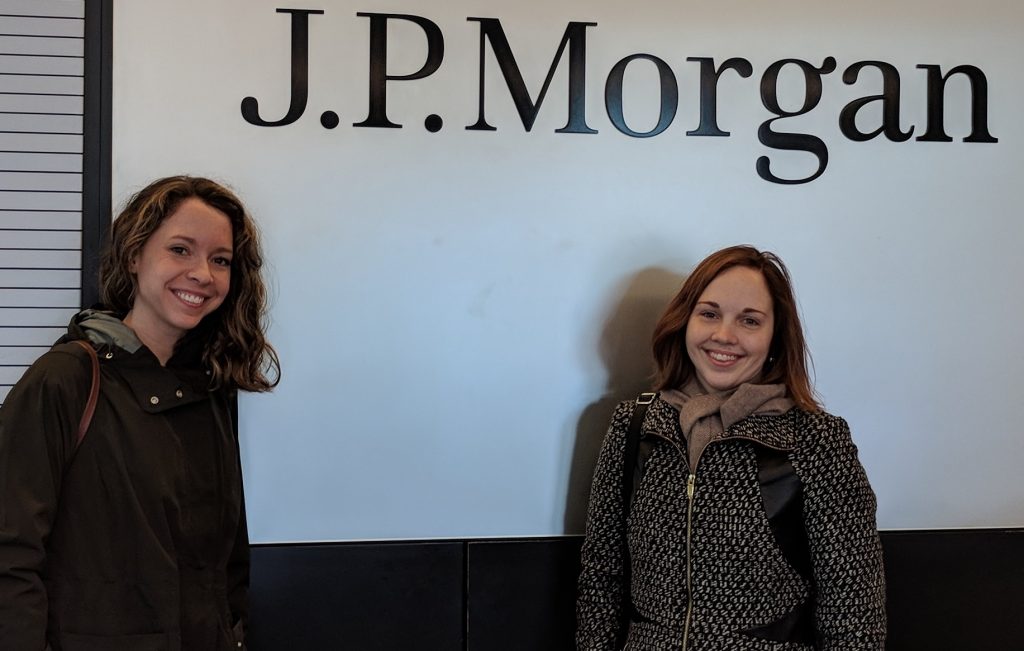
Nelaimischkies and Perschke, both J.P. Morgan employees, had the opportunity to visit their firm’s Dublin office.
“Visiting international businesses, talking with local governments, and hearing firsthand how people will actually be impacted by Brexit was far more informative than a book or a lecture. Not only did I get to travel to a new country, but I was also able to envision the potential of a career with travel outside the United States.”
This trip to the Republic of Ireland and the United Kingdom was just one of the many opportunities Kellstadt students have had this year to experience education on an international level. DePaul students have countless opportunities to set themselves apart in the job market by utilizing study abroad and other experiential learning.
Learn more about:











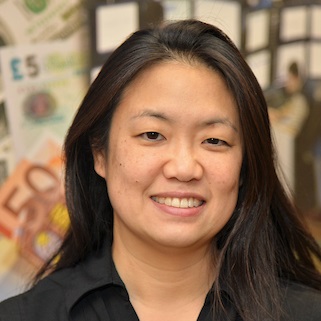




Recent Comments